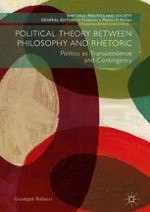2018 | OriginalPaper | Buchkapitel
3. The Union of Philosophy and Rhetoric: Cicero and Quintilian
verfasst von : Giuseppe Ballacci
Erschienen in: Political Theory between Philosophy and Rhetoric
Verlag: Palgrave Macmillan UK
Aktivieren Sie unsere intelligente Suche, um passende Fachinhalte oder Patente zu finden.
Wählen Sie Textabschnitte aus um mit Künstlicher Intelligenz passenden Patente zu finden. powered by
Markieren Sie Textabschnitte, um KI-gestützt weitere passende Inhalte zu finden. powered by
